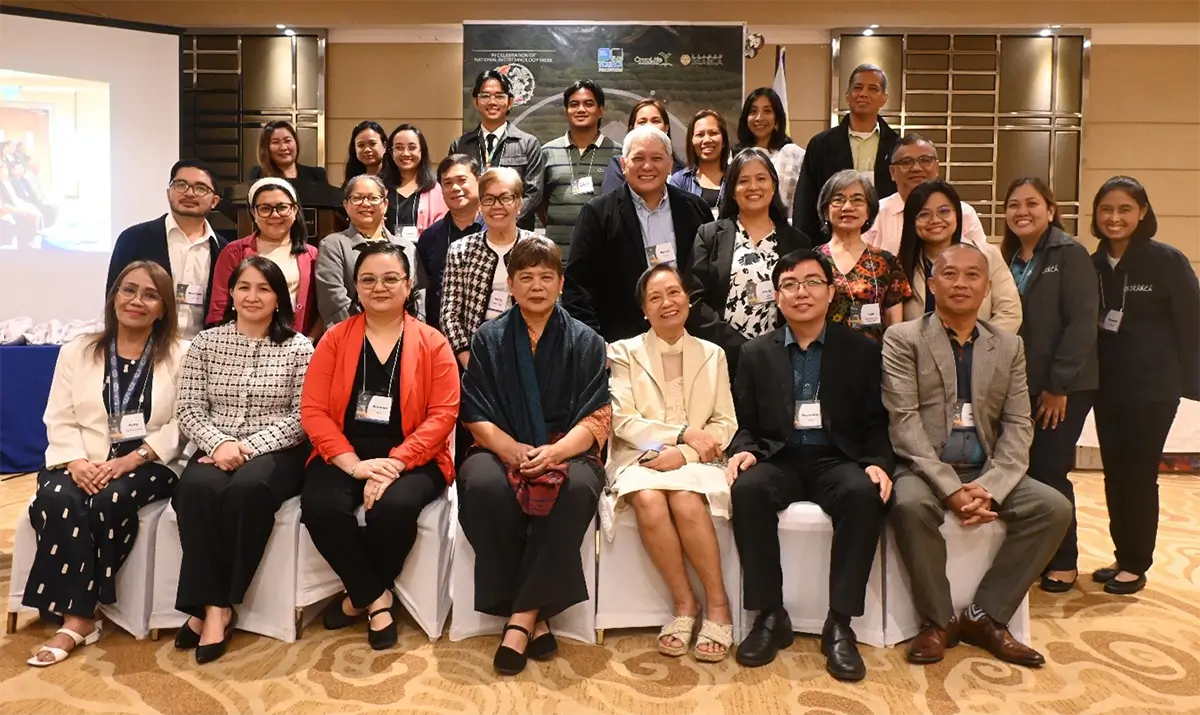 Participants from the science, government, and media sectors come together to strengthen dialogue and collaboration on biotechnology research, regulation, and communication.
Participants from the science, government, and media sectors come together to strengthen dialogue and collaboration on biotechnology research, regulation, and communication.
MANILA, Philippines—Scientists, regulators, and media professionals convened in a media forum jointly organized by Science Communicators Philippines (SciCommPH), CropLife Philippines, and the Southeast Asian Regional Center for Graduate Study and Research in Agriculture (SEARCA) on 14 October 2025 at the Century Park Hotel, Manila.
The forum brought key stakeholders into dialogue on the country's biotechnology research, regulation, and adoption landscape. Discussions highlighted progress in agricultural innovation and the growing need for stronger communication and policy coherence in the sector.
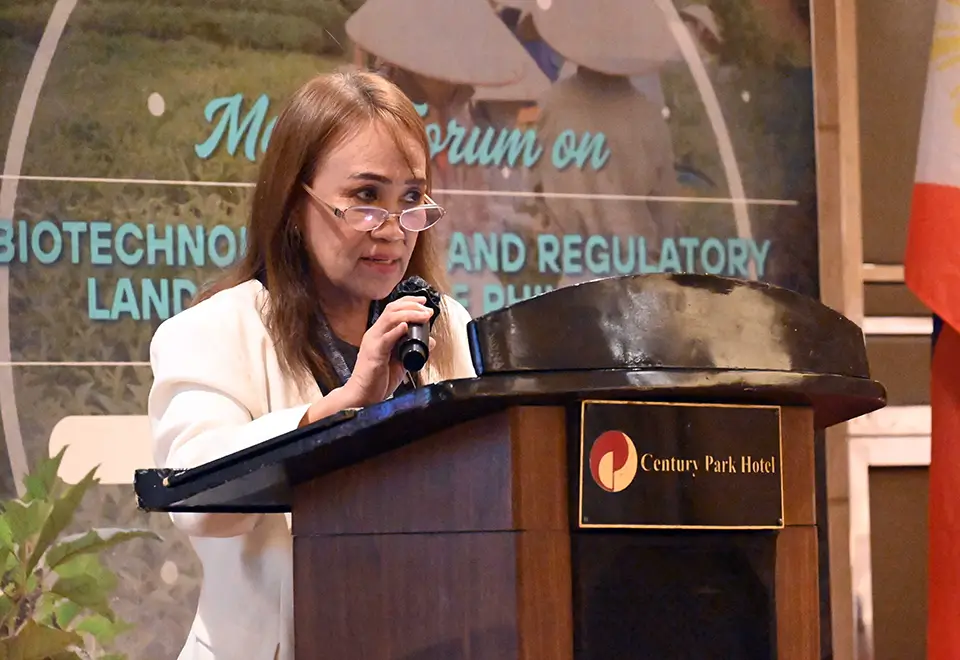 Dr. Ruby Roan, Cristobal, SciCommPH President, highlights the media’s role in strengthening public understanding of biotechnology.
Dr. Ruby Roan, Cristobal, SciCommPH President, highlights the media’s role in strengthening public understanding of biotechnology.
In her welcome message, Dr. Ruby Roan Cristobal, SciCommPH PresidentmPH, underscored biotechnology's vital role in addressing food security, public health, and climate resilience. She urged members of the media to strengthen their science reporting skills and engage with credible sources to help the public better understand biotechnology.
"Let this be a session of constructive engagement, productive discussion, and shared commitment to advancing the well-being of Filipinos through the safe, responsible, and effective application of agricultural biotechnology," she emphasized.
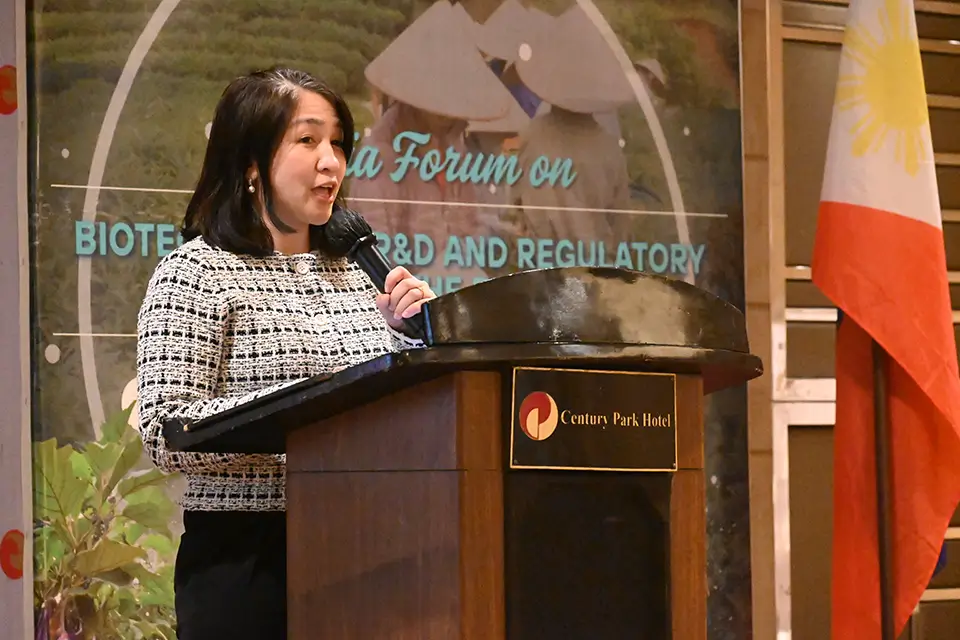 Dr. Gerlie Tatlonghari, SEARCA Program Head for Research and Thought Leadership, emphasizes the importance of linking scientific innovation with effective communication.
Dr. Gerlie Tatlonghari, SEARCA Program Head for Research and Thought Leadership, emphasizes the importance of linking scientific innovation with effective communication.
Dr. Gerlie Tatlonghari, SEARCA Program Head for Research and Thought Leadership, emphasized that scientific innovation must go hand in hand with effective communication to create meaningful impact. She highlighted that collaboration among scientists, regulators, and the media is important in building a shared understanding of biotechnology's contribution to sustainable agricultural development.
"The media plays an indispensable role as storytellers, educators, and catalysts of public understanding. Hence, we invite the media to bridge the science and policy on agri-biotechnology to combat misinformation through evidence-based reporting," she said.
 Resource speakers at the media forum, namely, (from left) Ms. Kristine Tome of ISAAA; Mr. Joy Bartolome Duldulao, PhilRice Branch Director, Isabela Station and Co-lead, PhilRice Healthier Rice Program; Dr. Lourdes Taylo of the UPLB Institute of Plant Breeding Scientist; Dr. Clarisse Gonzalvo of the UPLB College of Development Communication, share updates on biotechnology research and crop innovation. Ms. Jenny Panopio of CropLife Philippines (rightmost) served as the plenary session moderator.
Resource speakers at the media forum, namely, (from left) Ms. Kristine Tome of ISAAA; Mr. Joy Bartolome Duldulao, PhilRice Branch Director, Isabela Station and Co-lead, PhilRice Healthier Rice Program; Dr. Lourdes Taylo of the UPLB Institute of Plant Breeding Scientist; Dr. Clarisse Gonzalvo of the UPLB College of Development Communication, share updates on biotechnology research and crop innovation. Ms. Jenny Panopio of CropLife Philippines (rightmost) served as the plenary session moderator.
The plenary presentations focused on global developments and local initiatives in biotech R&D. These included updates on genetically modified and gene-edited crops, ongoing research on Malusog (Golden) Rice, Bt eggplant, and Bt corn, and studies on the adoption of Bt corn by Filipino farmers.
Speakers shared how advances in genetic modification and gene editing are helping address nutritional deficiencies and pest resistance. They also identified persistent challenges such as misinformation and uneven public awareness of biotechnology regulations. Ms. Jenny A. Panopio, Biotech Consultant of CropLife Philippines, moderated the plenary session.
Ms. Kristine Tome, Program Officer II of the International Service for the Acquisition of Agri-biotech Applications (ISAAA) presented updates on global biotechnology trends and innovations in gene editing. She noted that the area planted to genetically modified (GM) crops increased by about 10 percent from 2019 to 2024, with 32 countries, mostly developing nations, adopting biotech crops.
"We must continue building partnerships to advance sustainable, innovative, and inclusive agricultural biotechnology for the Filipino people," Tome urged the participants.
Mr. Joy Bartolome Duldulao, Branch Director of the Philippine Rice Research Institute (PhilRice) Isabela Station, presented the Healthier Rice Program. The initiative promotes biofortified rice varieties to combat malnutrition and strengthen resilience to environmental stress. He explained that Malusog Rice (Golden Rice) and High-Iron and Zinc Rice (HiZR) aim to address the country's persistent nutrition challenges: 14 percent of pregnant women are anemic, 22 percent of children under five are stunted, and 24 percent are Vitamin A deficient.
"Rice can do more than fill our stomachs—it can nourish lives, strengthen communities, and build a healthier nation," Duldulao emphasized.
On the other hand, Dr. Lourdes Taylo, Scientist I at the Institute of Plant Breeding, University of the Philippines Los Baños (UPLB), shared two decades of research on Bt eggplant. This GM eggplant was the first developed locally to resist the eggplant fruit and shoot borer, a pest that causes up to 80 percent yield loss.
"Bt eggplant offers farmers a safe, effective, and environmentally friendly alternative to chemical control," Taylo said, citing field trials that showed higher yields, reduced costs, and minimal impact on beneficial insects.
Dr. Clarisse Gonsalvo of UPLB College of Development Communication presented her study that examined the social dimensions of Bt corn farming in Pampanga, Philippines. The research explored how farmers navigate adoption decisions amid policy shifts and public debates. The research found that Bt corn farmers are rational decision-makers, guided by trust, satisfaction, and experience rather than solely by policy or external influence.
"Adoption is not just about yield, it's also about identity and trust," Gonzalvo explained. "Empowerment happens when farmers feel seen, heard, and supported."
Gonsalvo urged policymakers to engage farmers as partners in innovation and to integrate social science insights when shaping biotechnology adoption strategies.
"If the precautionary principle tells us, 'when in doubt, stop,' social science tells us, 'when in doubt, listen,'" she said.
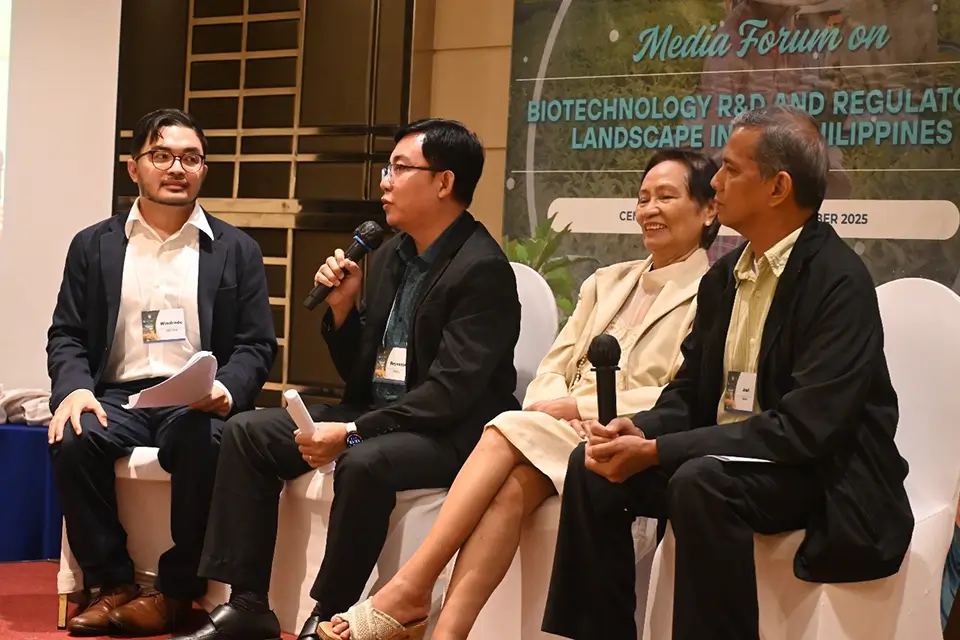 Regulators discuss the Philippines' leadership in biosafety and the need to strengthen science-based biotechnology policies.
Regulators discuss the Philippines' leadership in biosafety and the need to strengthen science-based biotechnology policies.
In the panel discussion, Dr. Joel Adorada of the DA-Bureau of Plant Industry, Dr. Saturnina Halos of the DA-Biotechnology Program Office, and Dr. Reynante Ordonio of PhilRice discussed the country's regulatory progress and challenges. They acknowledged, however, that challenges such as judicial interventions, local government bans, and public misinformation continue to slow biotechnology adoption. The panel called for the need to promote coexistence among biotech, conventional, and organic farming systems to give farmers the freedom to choose technologies that best fit their needs. Dr. Winifredo Dagli of UPLB College of Development Communication moderated the panel discussion.

During the open forum, participants raised practical concerns regarding seed access, affordability, and intellectual property, as well as questions about the differences between genetic modification and gene editing. Experts explained that while genetic modification involves introducing DNA from another organism, gene editing enables precise changes within the plant's own genetic material. Both are considered forms of biotechnology, but gene-edited products may fall under more relaxed regulatory categories depending on their characteristics.
Farmers' experiences shared during the discussion highlighted that farmer interest in biotech adoption remains strong, and that visible results in productivity and income largely drive their adoption. However, gaps in seed distribution and market access were noted, along with the continuing need to engage more sectors, especially the judiciary and legislative bodies, to ensure that biotechnology policies are supportive, science-based, and inclusive.
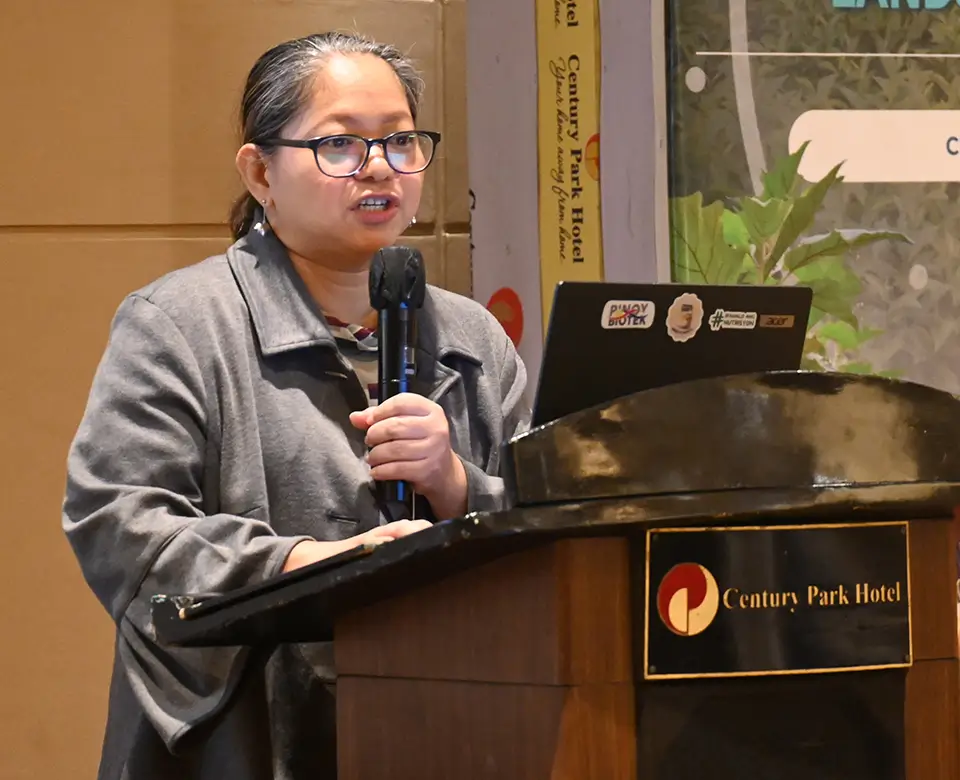
In her synthesis, Ms. Ma. Aileen Garcia, Senior Manager, Project Coordination & Advocacy of Healthier Rice Program, International Rice Research Institute (IRRI), underscored the vital role of science communication in advancing biotechnology, stating that "science communication is key to bridging innovation and public understanding."
She also emphasized the need to engage multiple sectors, noting that "we need to work with policymakers, the judiciary, and the public early on to build trust and sustain support for innovations like healthier rice."
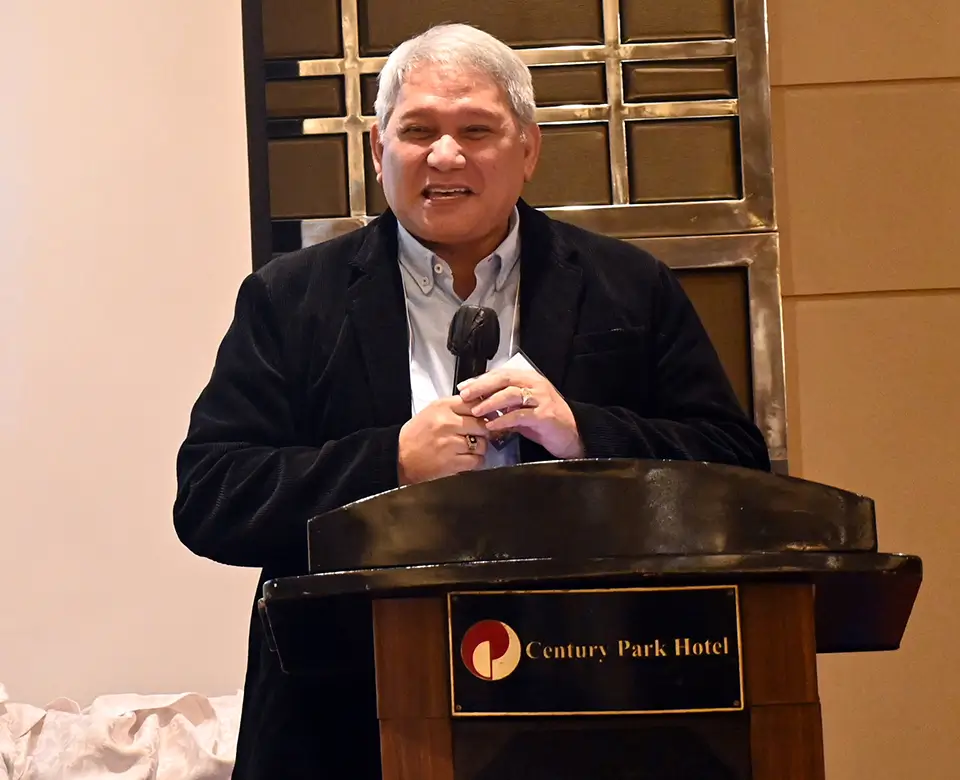 Mr. Ramon Abadilla, Executive Director of CropLife Philippines, calls on stakeholders to keep the biotechnology story moving forward.
Mr. Ramon Abadilla, Executive Director of CropLife Philippines, calls on stakeholders to keep the biotechnology story moving forward.
The forum concluded with a shared call for stronger science communication efforts to explain not just the technology but also the broader development context in which biotechnology operates. Participants agreed that stronger collaboration among scientists, regulators, and media professionals is key to ensuring that agricultural innovations continue to create real benefits for Filipino farmers and consumers alike. As Mr. Ramon Abadilla, Executive Director of CropLife Philippines, emphasized in his closing remarks, the story of biotechnology is one worth telling, as it reflects inclusivity, resilience, and sustainability. He urged everyone to keep this story moving forward to create a meaningful impact for the farmers.